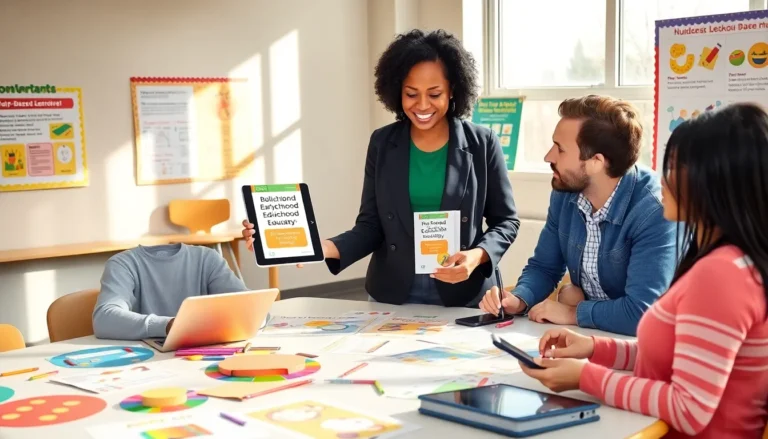Table of Contents
ToggleIn a world where learning can happen in the time it takes to brew a cup of coffee, mobile app learning has taken center stage. Gone are the days of lugging around heavy textbooks or sitting through boring lectures. Now, knowledge fits right in your pocket, ready to be devoured at a moment’s notice. Whether it’s mastering a new language or picking up coding skills, mobile apps make education as easy as scrolling through social media.
Overview of Mobile App Learning
Mobile app learning has gained prominence as a flexible educational tool. Users can access a vast array of courses with just their smartphones or tablets. This accessibility allows individuals to learn at their own pace, accommodating diverse schedules.
Innovative features in many apps enhance the learning experience. Interactive elements, like quizzes and discussions, engage users and reinforce knowledge. Gamification techniques transform lessons into enjoyable activities, encouraging consistent practice.
Available data supports the effectiveness of mobile learning. Research shows that 79% of learners using mobile apps report improved retention of information. Many educational apps offer social features, allowing users to connect with peers for collaborative learning.
Convenience remains a significant advantage of mobile app learning. Students can study during commutes, breaks, or any available downtime. This flexibility makes continuous education feasible for busy individuals.
Diverse subjects are covered by various learning apps. Users can explore skills like coding, graphic design, and foreign languages. Each app typically provides structured content, ensuring users stay organized throughout their educational journey.
Overall, mobile app learning embodies the future of education by merging technology and accessibility, significantly reshaping how people acquire new knowledge and skills in today’s fast-paced world.
Benefits of Mobile App Learning
Mobile app learning offers significant advantages that enhance education. It fosters an environment where learners can thrive.
Flexibility and Accessibility
Flexibility allows learners to choose when and where to study. Users access courses anytime through smartphones or tablets. This adaptability fits effortlessly into busy schedules, making education accessible to everyone. Individuals can utilize spare moments, such as during commutes or breaks, to engage with learning materials. Furthermore, mobile app learning dispenses with traditional classroom constraints, allowing self-directed learning. This approach encourages learners to pursue topics that interest them without geographical limitations. Research indicates that 79% of learners using mobile apps experience enhanced information retention, showcasing the effectiveness of this flexible educational method.
Personalized Learning Experience
Personalized learning experiences cater to individual needs and preferences. Mobile learning apps often utilize advanced algorithms to recommend tailored content based on user performance. Such customization helps users engage with materials that suit their learning styles and paces. Learners can set specific goals and track progress, fostering a sense of achievement. Many apps incorporate features like interactive quizzes and adaptive learning pathways, enabling users to focus on areas that require improvement. Comprehensive analytics provide insights into strengths and weaknesses. This data-driven approach helps users maximize their educational journey, creating a more effective and enjoyable learning experience overall.
Key Features of Effective Learning Apps
Effective learning apps include several key features that enhance user experience and optimize educational outcomes. These features are designed to cater to the diverse needs of learners.
User-Friendly Interface
A user-friendly interface simplifies navigation, making it easy for learners to access the content they need. Clear menus and intuitive layouts encourage exploration, reducing the frustration often associated with complex designs. Users appreciate apps that prioritize accessibility, as they help all learners, regardless of technical skills. For example, large buttons and readable fonts increase usability for everyone. Consistent visual elements promote familiarity, enabling learners to focus on content rather than technology.
Interactive Content
Interactive content engages learners actively, enhancing retention and comprehension. Quizzes, polls, and simulations allow users to apply knowledge in real-time, making learning immersive. Features that encourage participation foster a sense of community among learners. Apps utilizing gamification techniques, like points and badges, motivate individuals to complete courses. Customizable learning paths ensure users can explore subjects at their own pace. Research highlights that 79% of learners using interactive content retain information better, demonstrating its effectiveness in mobile app learning.
Popular Mobile Learning Apps
Mobile learning apps cater to diverse educational needs, enabling users to expand their knowledge efficiently. Various apps stand out for their unique offerings in language and skill development.
Language Learning Apps
Language learning apps like Duolingo and Babbel provide immersive experiences for learners. Duolingo uses a gamified approach, making language acquisition enjoyable through interactive exercises. Babbel focuses on conversational skills, helping learners practice practical language usage. Transparent progress tracking enables users to monitor their advancement, fostering motivation. Apps often implement spaced repetition techniques, enhancing vocabulary retention. Additionally, social features allow learners to connect with peers, creating a collaborative learning atmosphere.
Skill Development Apps
Skill development apps such as Skillshare and Udemy offer extensive course selections across various disciplines. Skillshare emphasizes creativity through tutorials in design, photography, and writing. Udemy provides an expansive catalog, featuring courses on programming, marketing, and personal development. Users benefit from flexible learning schedules, engaging video content, and expert instructions. Each platform often includes beginner-to-advanced content, catering to different skill levels. Community feedback and ratings further guide users toward quality courses, enriching the learning experience.
Challenges in Mobile App Learning
Mobile app learning faces various challenges that can hinder the educational experience. A primary concern involves maintaining focus in a digital environment filled with distractions.
Distractions and Focus Issues
Students often struggle to concentrate when using mobile apps. Notifications from other apps can interrupt learning, leading to fragmented attention. Devices allow immediate access to social media, games, and other diversions, which can easily draw users away from their studies. Maintaining focus becomes especially challenging in environments that lack quiet spaces. Setting specific study times and turning off notifications can help minimize distractions, creating a more effective learning atmosphere.
Quality of Content
The quality of educational content in mobile apps varies significantly. Some apps provide comprehensive resources while others may lack depth, hindering user learning experiences. Users often encounter poorly structured courses that do not effectively teach key concepts. The proliferation of apps makes it necessary for learners to research and select high-quality options. Evaluating user reviews and researching app developers can enhance the selection process, ensuring users invest time in platforms offering credible and engaging content.
Mobile app learning is revolutionizing education by offering unparalleled flexibility and accessibility. It empowers learners to engage with content on their terms, transforming how knowledge is acquired. With innovative features that enhance user experience and a wide array of subjects available, mobile apps cater to diverse learning styles and schedules.
While challenges like distractions and content quality persist, the benefits of mobile app learning far outweigh the drawbacks. As technology continues to evolve, the potential for personalized and engaging educational experiences grows. Embracing mobile learning can lead to significant advancements in skill development and knowledge retention, making it an essential tool in today’s educational landscape.




